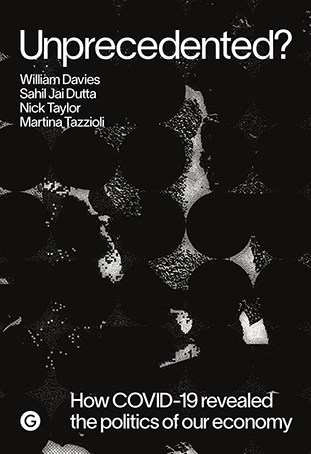Unprecedented? Audiobook
William Davies, Sahil Jai Dutta, Nick Taylor and Martina Tazzioli
Publication
A critical and evidence-based account of the COVID-19 pandemic as a political-economic rupture, exposing underlying power struggles and social injustices.
The dawn of the COVID-19 pandemic represented an exceptional interruption in the routines of work, financial markets, movement across borders, and education. The policies introduced in response were said to be unprecedented—but the distribution of risks and rewards was anything but. While asset-owners, outsourcers, platforms, and those in spacious homes prospered, others faced new hardships and dangers.
Unprecedented? explores the events of 2020-21, as they afflicted the UK economy, as a means to grasp the underlying dynamics of contemporary capitalism, which are too often obscured from view. It traces the political and cultural contours of a "rentier nationalism" that was lurking prior to the pandemic, but was accelerated and illuminated by COVID-19. But it also pinpoints the contradictions and weaknesses of this capitalist model and the new sources of opposition that it meets.
An empirical, accessible, and critical analysis of the COVID economy, Unprecedented? is essential listening for anyone seeking to understand the political and economic turbulence of the pandemic’s first 18 months.
A powerful and persuasive examination of how Covid-19 both illuminated and compounded the vast debts - monetary and non-monetary, sovereign and interpersonal - underpinning contemporary capitalism, and of the staggering inequalities associated with the establishment and repayment of those debts. The political nature of ‘the economy' has rarely been as clear.
Unprecedented? asks uncommon questions about the Covid-19 global pandemic. How did the pandemic perform crisis? And how does a particular political economy produce crisis for some but not for others? By stepping back from habitual assumptions about the nature of crisis, the authors shed light on our contemporary political economy. They provide real insight into how the Covid-19 pandemic is an extraordinary event that was nonetheless shaped by all-too-common political decisions and policies.
These authors argue that the Covid-19 crisis revealed a British economy dependent upon the generation and redistribution of rents that were protected by the elasticity of the public balance sheet and strengthened by the capacity of the informal care sector to absorb shocks. Once both of these ‘deep wells’ of support of the formal market-economy are exposed, a very different picture of the UK economy, and who benefits from it, emerges.
